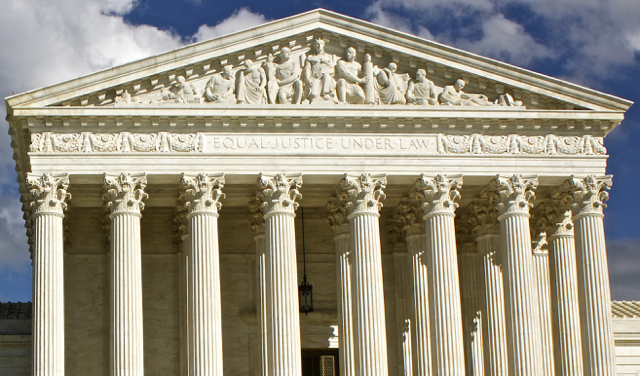You know an abortion law is bad when pro-abortion Supreme Court Justice Elena Kagan condemns it during oral arguments.
But that is just what happened at the Supreme Court this morning when it considered a lawsuit over a California law forcing pregnancy centers to promote abortions. On Tuesday, the Supreme Court heard oral arguments in National Institute of Family and Life Advocates v. Becerra, a lawsuit brought by pregnancy centers that don’t want to be compelled to advertise abortions.They say the California Reproductive FACT Act violates the free speech clause in the First Amendment.
During the arguments, Kagan, an abortion activist appointed by former pro-abortion president Barack Obama, says the law was specifically written to target pro-life pregnancy centers.
U.S. Supreme Court justices cast doubt on California’s requirement that licensed pregnancy-counseling clinics tell patients they might be eligible for free or discounted abortions.
Hearing arguments in Washington, justices from across the court’s ideological spectrum suggested the law might violate the speech rights of clinics that oppose abortion and promote childbirth. Justice Elena Kagan said the law appeared to be “gerrymandered” so that it targeted those facilities.
“If it has been gerrymandered, that’s a serious issue,” said Kagan.
Kagan was not the only judge on the high court’s pro-abortion side to condemn the California statute.
“Even some of the liberal justices voiced concern over parts of the law during an hour-long argument in an appeal by a group of non-profit facilities called crisis pregnancy centers of a lower court ruling upholding the Democratic-backed 2015 law,” AP reports.
And it reported that one key Supreme Court justice appears inclined to rule against the law.
The centers seemed to have a strong supporter in Justice Anthony M. Kennedy, who is normally the deciding vote when the court considers ideologically divisive issues.
He asked only questions that were hostile to the law, and at one point said he thought at least one of the law’s requirements was a clear “undue burden” on the clinics.
Alliance Defending Freedom President, CEO, and General Counsel Michael Farris argued in court on behalf of the pregnancy centers.
“Today, before the United States Supreme Court justices, I argued on behalf of the National Institute of Family and Life Advocates that the California law forcing pro-life pregnancy centers to advertise for abortions is unlawful government-compelled expression,” hetold LifeNews after the oral arguments. “A government that tells you what you can’t say is dangerous, but a government that tells you what you must say—under threat of severe punishment—is alarming.”
SUPPORT PRO-LIFE NEWS! Please help LifeNews.com with a donation to share the pro-life message
“The state of California, at the behest of the abortion industry, is using its power to force pro-life pregnancy centers to be complicit in abortion by telling women how to get one free or at a reduced cost. Even worse, AB775 specifically targets these small non-profit organizations that exist to provide women with life-affirming information they may not otherwise receive,” Farris added. “Other federal courts have already recognized that this type of government compelled speech violates the foundation of the freedom we have in the America, making the 9th Circuit’s denial of free speech the exception rather than the rule. In fact, courts have invalidated or mostly invalidated similar laws in Texas, Maryland, and New York City.”
Farris continued: “When the government decides what people should and should not say, other freedoms are sure to disappear soon after. The government exists to serve its people, and not the other way around. Even if you are not pro-life, do you want the government setting up its own advertising mandates for nonprofit organizations and then punishing any who disagree? The First Amendment does not allow the government to force you to speak its message. That’s especially true when you are pursuing a religious mission of simply providing resources and support to women free of charge.”
“California has the heavy burden of justifying its law under the Constitution or else the law must be struck down to give freedom back to the people. After arguments this morning, I am optimistic the justices will find that the state has not carried this burden and will continue their long tradition of giving speech the highest level of protection it deserves,” he concluded.
The case, National Institute of Family and Life Advocates v. Becerra, challenges a 2015 California law that forces pro-life pregnancy centers to advertise abortions. Oral arguments will be heard Tuesday.
Thomas Glessner, president of National Institutes of Family and Life Advocates, told the McClatchy News Service the law forces about 200 pregnancy centers in California to be “abortion referral agencies.”
Abortion activists with NARAL and the Center for Reproductive Rights argue that the law is necessary because pregnancy centers “manipulate and deceive” pregnant women. But Jay Hobbs of Heartbeat International pointed out these pro-abortion groups have not produced one single testimony from a woman who has been harmed by a pregnancy center (other than a few abortion activists who were trying to trap pregnancy centers).
The law charges a cumulative fine of $1,000 for every repeated instance that the notice is not communicated to a client. This law sabotages freedom of speech by forcing organizations to encourage actions that are in direct opposition to their religious beliefs and counter the mission and purpose of their organizations.
Similar government-sponsored speech for pregnancy centers has been struck down as unconstitutional in Austin, Texas, Baltimore and Montgomery County, Maryland, and New York City.
The U.S. Court of Appeals for the 9th Circuit upheld a federal district judge’s decision to allow the law to remain in effect in October. The Supreme Court will decide whether to reverse the ruling, halt the law, and affirm that forcing the centers to provide the free advertising contrary to their core mission is a violation of their constitutionally protected freedoms.








